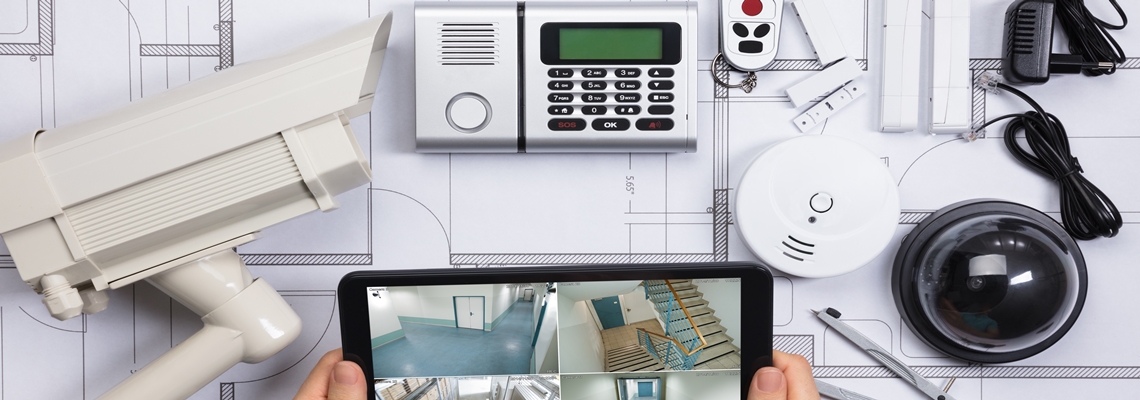
Q. What is home automation?
Show AnswerA. Home automation means you have the opportunity to control other aspects of your home environment, in addition to monitoring and controlling your home alarm system.
The most popular home automation feature is the ability to control the temperature in your home. If you forget to adjust the a/c or heat when you leave for the weekend, you can reset the temperature from a portable device. That saves energy. That saves you real money.
Locking the doors remotely is also a popular feature. It allows you to double check that your spouse or child actually locked the doors behind them when they left for work or school.
The ability to adjust the lighting in your home is a great feature if you’re away overnight. Some home automation systems allow you to program lights to turn on and off randomly throughout your home. The appearance that someone is at home is a known deterrent to intruders.
Some home automation systems even allow you real-time access to cameras. Not only can you check in and see if everything is safe, but you can also keep an eye on children that get home from school before you get home from work. Some even have a two-way communication feature so you can remind your children to get started on their homework when you see them playing a video game instead. The kids should just love that, right!
Q. How can a home security system protect my home?
Show AnswerA. It depends a lot on the system and accessories you choose for your home. Nearly every system includes at least one motion sensor best placed in a doorway, such as the primary entry point into your home.
There are a variety of other sensors that you can use throughout your home ~ window sensors, glass shattering sensors, garage door sensors, interior motion sensors, etc. Some sensors can even take a quick snapshot when they’re tripped so you can see exactly who, or what, caused the sensor to go off.
Although sensors are the backbone of every home security system, cameras are an especially good feature to add to your system. There are both indoor and outdoor cameras available with many plans.
Don’t forget to advertise the home security system you use prominently in your yard. Not only can a home security system help identify an intruder if you experience a break-in, just having the system is usually enough to deter the would-be burglar. When they see that posted home security sign in your front yard, they’ll look elsewhere for easier pickings!
Q. How much does a home security system cost?
Show AnswerA. It depends on the system you choose. One thing you’ll want to keep an eye out for is whether or not you have to pay for the equipment, or if the equipment is included in the price. Some systems require you to purchase all the equipment upfront, which can cost you hundreds of dollars. However, once you have the equipment, monthly fees are relatively low.
You also have to look out for installation fees. Many systems today offer a do-it-yourself (DIY) option, which means you won’t have to pay an installation fee at all. However, there are still companies out there who require professional installation. If you are interested in one of these providers, keep your eye open for special deals. Many of them will offer free installation from time to time. That can save you a lot of money.
The monthly cost of a home security system can vary widely, depending on the equipment and level of service you require. Some of the cheapest systems start at just $14.99 per month, but that can skyrocket if you choose to add additional sensors, cameras, and services, like home automation, to your package.
It’s best to determine a budget before you go shopping for a home security system. That helps to ensure that you don’t pay for additional equipment and features that may seem neat at the moment, but that you really don’t need.
Q. Are home security systems really worth the money?
Show AnswerA. Definitely! The key is finding a system that works for you and provides you with a valuable return on your investment.
The most obvious way a home security system protects you and your home is the fact that intruders can more easily be identified and apprehended. However, simply having a home security system is usually enough to deter burglars in the first place, so make sure you display that system tag prominently in your front yard.
Home security systems do a lot more today than they used to. They allow you to stay connected to what’s going on in your home while you’re away. Home automation features are especially popular with families.
Many people believe having a home security system is worth the money simply because it provides them with some serious peace of mind.
Q. Is a home security system a good idea for renters?
Show AnswerA. Apartments are almost twice as likely to be burglarized than homes. A home safety system is definitely a good idea for renters.
Although nearly any system can easily be installed in an apartment, it’s best to choose a flexible, do-it-yourself (DIY) system. Then, you can take your equipment with you when you move.
Q. Will a home security system affect my insurance?
Show AnswerA. You can reduce your premium by up to 20%. When you install that home security system, don’t forget to give your homeowner’s insurance company a call.
It’s been statistically proven that homes without security systems are much more likely to be burglarized. Homeowner’s insurance companies are willing to offer discounts on premium payments. They anticipate avoiding expensive claims later.
Q. Can I use my existing equipment with a new provider?
Show AnswerA. It all depends on the company you choose. Some companies are happy to modify an existing system so that you can enjoy their services without paying equipment fees.
However, not all companies allow this, so it is important to ask the company you’re interested in about this before signing up for service.
Q. Will my pet trigger a motion alarm sensor?
Show AnswerA. In the past, it was common for an animal to trip a motion sensor. That is as frustrating for homeowners as it is for home alarm system companies. Fortunately, today’s sensors are much more intuitive.
Most sensors today have a weight limit. That limit varies between carriers. That means a small pet wandering by shouldn’t trip the alarm. However, these sensors aren’t foolproof. Sometimes accidents happen. This is especially the case if you have a large dog.
Ask about pet sensitive motion alarm sensors when you’re in the process of purchasing a system. A customer service representative will be able to provide you with additional ideas and equipment that will reduce the likelihood of your pet setting off a false alarm.
Q. Is a home security system tax deductible?
Show AnswerA. Since you can save on your homeowner’s insurance with a home alarm system, you may be wondering if your system is also tax deductible.
The short answer is no, but there are a few exceptions. You cannot claim a deduction when monitoring personal property ~ but ~ if you use a portion of your home as an office, or if you run a professional daycare service, a portion of the cost may be tax deductible. In order to take the deduction, you must use that space solely for business purposes.
Before you attempt to deduct the cost of a home security system, touch base with your tax advisor.
Q. Will my system still work if the power goes out?
Show AnswerA. Understanding what kind of system you have is essential to understanding the answer to this question.
Many systems today are cellular-based, which means the system can continue to function in the event of an outage, thanks to backup batteries. Because of this feature, it is the most popular home alarm system option.
Other approaches are not immune to power outages. Systems that function with a land-based phone line or a voice-over-internet-protocol (VoIP) are susceptible to outages. Make sure that you understand what kind of system you’re installing so you’ll know whether it will work during a power outage.
Q. Should I choose DIY or professional installation?
Show AnswerA. If you have some technological know-how, it’s usually in your best interest to choose a DIY installation. Not only will you save money on installation costs, but you can easily customize the system to fit your needs. In addition, you are able to pack up the equipment and reinstall it at a new location quite easily.
However, if you plan on staying in the same home for many years, or if you are truly electronically challenged, you may want to consider professional installation. Some companies require it, but others offer both DIY and professional installation options. That way, if you wish, you can give DIY installation a try before paying for professional installation.










